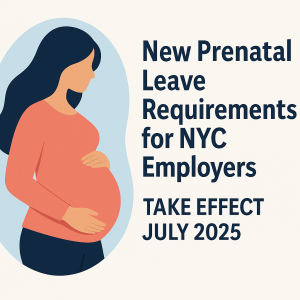Does an employer have to pay employees for attending training courses or lectures?
Does an employer have to pay employees for time spent traveling to work or job sites?
The U.S. Department of Labor (“DOL”) recently answered these questions in some detail. The DOL issued two opinion letters on the compensability of time non-exempt employees spend at voluntary training sessions (FLSA2020-15) and of time employees spend traveling for work (FLSA2020-16).
Compensation for Attending Voluntary Training Sessions:
In FLSA2020-15, a non-profit hospice care asked whether staff must be paid for time they spent attending voluntary training sessions (e.g., courses, lectures, meetings), some of which include continuing education (CEU) components and may or may not be directly related to work.
As a general matter, the DOL regulations state that if the following criteria are not met, the employer must compensate employees for time spent attending training sessions:
- The training take place outside of employee’s regular working hours;
- Attendance by the employee is voluntary;
- Training is not directly related to employee’s job; and
- Employee does not perform productive work while attending such training.
However, even if the training is directly related to the employee’s job, if an employee voluntarily attends, outside of work hours, either (a) a program created by their employer corresponding to courses offered by independent bona fide institutions of learning or (b) an independent school, college, or trade school, then the employee’s attendance would not be compensable.
In short, the DOL opined that when employees voluntarily attend trainings outside of their regular working hours, such time will not be compensable. However, when employees voluntarily attend trainings during their regular working hours, such time will be compensable if the employer permits employees to do so during work hours.
A major takeaway is that employers can establish a policy that prohibits employees from attending voluntary trainings during work hours, unless it is only possible for employees to view or attend such trainings during work hours.
Compensation for Work-Related Travel Time:
In FLSA2020-16, a construction company inquired whether its non-exempt workers may or may not be entitled to pay for certain work-related travel time. As background, the company’s foremen retrieve trucks from the company’s principal place of business (“PPB”); drive the trucks to the job site, where foremen use trucks to move tools and materials around; and then return the truck to the PPB.
Generally, employees are not required to be paid for time spent commuting for work. However, if employees travel between the PPB and the job site and perform activities before or after work that benefit the employer and are essential to the employee’s principal work, then all such time is considered paid work time.
In addition, traveling to a remote job site for a one-day assignment must be treated as paid time (of course, the employer can deduct the amount of time the employee regularly spends commuting to and from their usual job site).
Overnight travel for work must be paid if such travel occurs during the employee’s regular work hours (even if on a nonwork day).
Aligned with the DOL regulations and case law, the main conclusions of the DOL’s opinion letter on compensation for work-related travel are:
- Time employees spend traveling between home and the PPB is unpaid because such time is considered everyday commuting time, including travel time from a hotel to the remote job site for overnight assignments.
- Employees must be paid for traveling between the PPB and job site, local or remote, only if it is vital to the employee’s primary duties to stop by the PPB and engage in any pre- or postliminary activities.
- If an employee is assigned to work requiring them to travel to a remote job site during their regular work hours and the employee drives their personal vehicle to that site, the employer must pay the employee for travel time at the start and end of the assignment (in excess of the employee’s regular commuting time) but not for any commutes between their home and the remote job site during the assignment.
- Further, if an employer offers its employees to travel to a remote job site as a passenger in, for instance, a company truck or via public transportation paid by the employer, but employees choose to drive themselves to the job site in their personal vehicles during their normal working hours, the employer can choose to pay for the amount of time the employees spent (1) driving to the remote job site or (2) would have spent riding as passengers in the company-sponsored travel method.
If you have further questions or concerns about the above-detailed DOL opinion letters and how your work policies may be affected, please contact Chaim Book at cbook@mb-llp.com or Sheryl Galler at sgaller@mb-llp.com.

